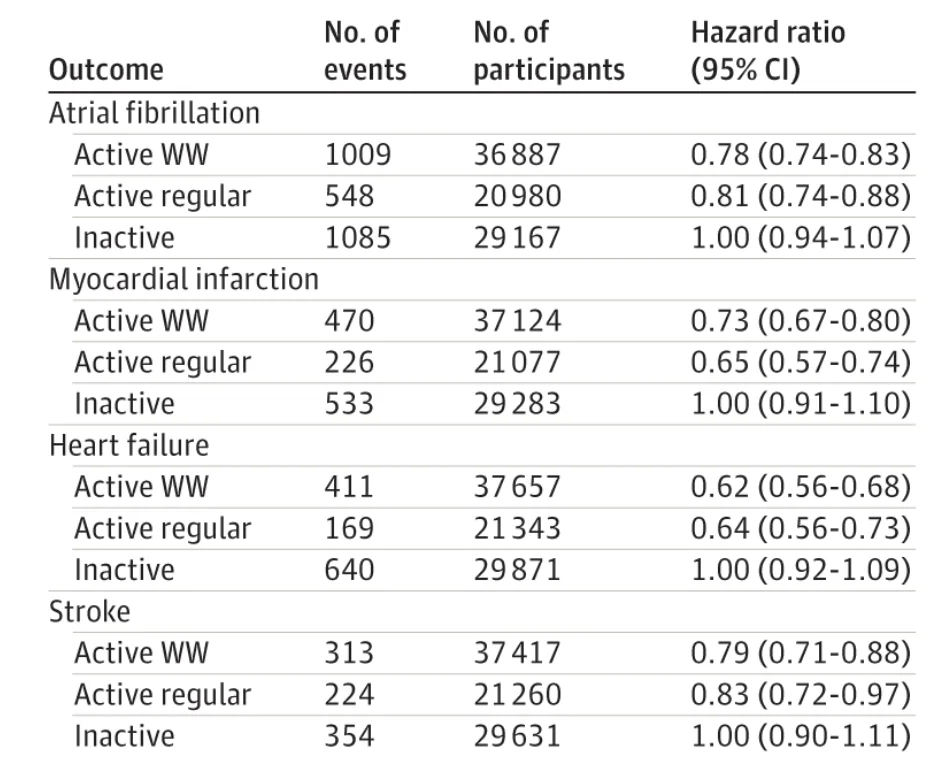A new study suggests that “weekend warriors”, people who only exercise for one or two days a week, enjoy similar cardiovascular benefits as those who exercise more regularly [1].
How crucial is a daily run?
The consensus of medical studies practically implores people to engage in at least some exercise, with current research strongly suggesting that people can get most of the health benefits from moderate levels of physical activity [2]. One prevalent idea is a need for consistency, with the idea that peole should clock some amount of exercise every day or every other day. People who are overwhelmed with work and family chores can find this an insurmountable hurdle, leading to frustration and the abandonment of exercise in general.
Until now, this notion has rarely been put to the test. In particular, the research about so-called “weekend warriors”, people who only exercise on weekends, is limited. This new study published in JAMA aims to expand our understanding of how different exercise patterns square against each other.
No difference in outcomes
The scientists used data from UK Biobank, a repository of health information on half a million British citizens that has enabled a lot of quality research in recent years. About a hundred thousand Biobank members wore accelerometers for a week, allowing scientists to capture the full scope of their physical activity and juxtapose it with their health biomarkers.
The researchers divided the subjects into three subgroups. The first one, active weekend warriors, reached or exceeded the weekly recommended amount of 150 minutes per week of medium-to-vigorous physical activity (MVPA) but clocked half or more of this activity over a period of one or two days. The second group, active regulars, also met the MVPA threshold, but their exercise activity was more evenly spread in time. Finally, the inactive group consisted of people who did not reach the recommended MVPA threshold.
The researchers assessed each group’s atrial fibrillation, myocardial infarction, and heart failure, controlling for several confounding variables such as age, sex, racial and ethnic background, tobacco use, socioeconomic status, alcohol intake, educational attainment, self-reported health, and diet quality. The median follow-up for assessment of health outcomes was 6.3 years.
For all outcomes, the reduction in hazard ratio was statistically similar for weekend warriors and active regular groups compared to the inactive group, although there was a trend towards lower risk of myocardial infarction for regular exercisers. These associations held for several other activity thresholds.
Despite some existing concern about the weekend warrior pattern leading to higher incidence of injuries [3], both activity patterns were associated with similarly lower risks of musculoskeletal conditions compared to the inactive group. The researchers note that the weekend warrior pattern appears quite common, with more than half of physically active people accruing most of their MVPA during one or two days per week.

More data is on the way
This study joins a few others that recently produced similar results, including one meta-analysis that found the “weekend warrior” pattern to be comparable to regular exercise in terms of cardiovascular and mortality benefits [4]. However, it has many limitations, the first of which is that it’s a populational study rather than a randomized controlled trial. The participants only wore accelerometers for one week, even though in large samples, activity patterns are known to change little over time. Finally, the follow-up period was on the shorter side.
Importantly, the data for this study was collected about ten years ago, when wearable accelerometers were still a novelty. Today, the amount of data flowing in from wearable devices is enormous, and soon we will probably have an even clearer understanding of the benefits that various activity patterns confer. For now, the upshot is that it is okay for people to go to the gym or on a run on weekends. In terms of health, they might be just as well off as people who exercise daily.
Within nearly 90,000 individuals providing wrist-based activity quantification, physical activity concentrated within 1 to 2 days was associated with similarly lower risk of cardiovascular outcomes to more regular activity. Future prospective studies are warranted to assess whether interventions to increase physical activity, even when concentrated within a day or 2 each week, improve cardiovascular outcomes.
Literature
[1] Khurshid, S., Al-Alusi, M. A., Churchill, T. W., Guseh, J. S., & Ellinor, P. T. (2023). Accelerometer-Derived “Weekend Warrior” Physical Activity and Incident Cardiovascular Disease. JAMA, 330(3), 247-252.
[2] Kraus, W. E., Powell, K. E., Haskell, W. L., Janz, K. F., Campbell, W. W., Jakicic, J. M., … & 2018 Physical Activity Guidelines Advisory Committee. (2019). Physical activity, all-cause and cardiovascular mortality, and cardiovascular disease. Medicine and science in sports and exercise, 51(6), 1270.
[3] Hartnett, D. A., Milner, J. D., & DeFroda, S. F. (2022). The Weekend Warrior: Common Shoulder and Elbow Injuries in the Recreational Athlete. The American Journal of Medicine, 135(3), 297-301.
[4] Kunutsor, S. K., Jae, S. Y., & Laukkanen, J. A. (2023). ‘Weekend warrior’and regularly active physical activity patterns confer similar cardiovascular and mortality benefits: a systematic meta-analysis. European Journal of Preventive Cardiology, 30(3), e7-e10.



